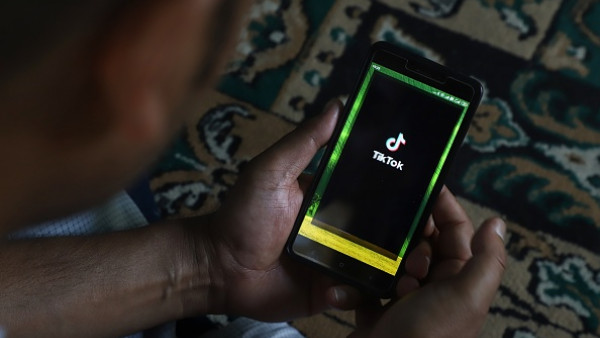A man uses TikTok on his mobile phone in Srinagar, Jammu and Kashmir, India on 30 June 2020 (Photo by Nasir Kachroo/NurPhoto via Getty Images)
Online users are saying enough to celebrity culture by kickstarting a new trend across TikTok and other social media platforms in solidarity with Gaza and Sudan.
The celebrity block list is the latest online movement garnering the attention of TikTokers in opposition to the stark dichotomy between the privileged few and the persecuted many.
The trending hashtag, #Blockout2024, sees users sharing videos compiling a list of celebrities to influencers to block en masse, in retaliation for their responses (or lack thereof) on the devastating conflicts in Gaza and Sudan.
At least 34,971 people, mostly women and children, have been killed in the Palestinian territory amid the seven-month war, which has been internationally decried as inconsistent with international humanitarian law.
In Sudan, the conflict has killed more than 14,000 people and wounded thousands more amid reports of widespread sexual violence and other atrocities that rights groups say amount to war crimes and crimes against humanity.
The New Arab takes a deep dive into the growing trend and how it aims to amplify social issues around the world.
What is ‘Operation Blockout’?
Critics online claim that the annual Met Gala, where members of the elite fashion world visibly flaunt their avant-garde and opulent style, further demonstrates the absurdity of such events that turn a blind eye to social issues.
While attendees wore dramatic dresses adorned in crystals and florals, pro-Palestine protests took place merely blocks away in New York.
This triggered the movement that was later coined as ‘Operation Blockout’.
Tiktok users such as @blockout2024, who is credited with founding the celebrity blocking campaign, have called out several of the world’s biggest names who are deemed as complicit.
From Kim Kardashian, Taylor Swift to Justin Bieber- users did not hold back on who is alleged to be blamed.
In one video Blockout2024 posted on TikTok, which has since accumulated over a million views, he said that followers have “full control of celebrities’ money and lives”.
“When we hate on them, they make money. When we praise them, they make money. But when we block their social media accounts and completely forget their names, they lose it all,” Tiktoker Blockout2024 said.
“The amount of attention we give them and the amount of engagement we give them is their direct currency. Take it from them.”
Celebrities will be unable to earn ad revenue by significantly reducing their followers, according to users, who say will pressure celebrities into highlighting Palestine and Sudan.
@blockout2024 You can also block news outlets that clickbait and artists on spotify
Jenny, a Tiktok user from Vietnam, told The New Arab that “the genocide going on in Palestine” prompted her to take part in the campaign.
“The algorithm of Tiktok allows anyone, disregard of age, sex or societal status, to be able to go viral as long as their content aligns with the interest of other users. That’s why the portrayal of any social issue on Tiktok has been shown to really be non-biased and very authentic, since it’s the voice of mundane people just like you and me,” she said.
“I’ve never been able to comprehend the power of social media until I saw a whole movement to support Palestine, Congo and Sudan started off from TikTok. Especially among Gen-Zs as they are perceived to be the generation that’s much more sensitive to social matters.”
The 22-year-old Tiktoker reiterated that with power comes responsibility- adding that celebrities’ silence has cost the miseducation of humanitarian crises taking place worldwide.
“I personally feel so much rage, as why people can put so much more effort into participating in a lavish event, which costs thousands of dollars, while being completely benevolent at the fact that people are being bombed to pieces on the other side of the world,” she told The New Arab.
“The Met Gala 2024 was an event that depicts the imbalance of power & resources distribution in our society.”
Celebrities react
The popularity of Operation Blockout has prompted responses from some celebrities who stepped forward to address their controversies.
US influencer Hayley Kalil, better known as @hayleybayley on TikTok, released an eight-minute apology video to discuss her polarising Met Gala video previously posted on her account.
The now-deleted clip saw Kalil lip-syncing to “Let Them Eat Cake”, a trending sound from 2006 movie Marie Antoinette starring Kirsten Dunst while dressed in a floral headdress and gown inspired by the infamous queen of France.
Meanwhile, fellow American influencer Chris Olson, who was also mentioned in many block lists, posted a TikTok video discussing his involvement in ‘Operation Olive Branch’- another online solidarity campaign for Gaza to aid displaced Palestinian families.
Following the backlash, pop singer Lizzo also shared a GoFundMe campaign for a Palestinian family raising money to flee Gaza, while promoting another for humanitarian relief in Sudan.
“Just under 72 hours since the trend started, Lizzo has uploaded a TikTok voicing out about donating to Gaza,” TikTok user Jenny told The New Arab.
“I think to a point in the future, when the divestment keeps on going, other celebrities would realize they couldn’t get people’s support anymore if they just run their careers to remain in their privilege bubble, while staying indifferent and tone-deaf about the sufferings and injustice of people around the world.”


